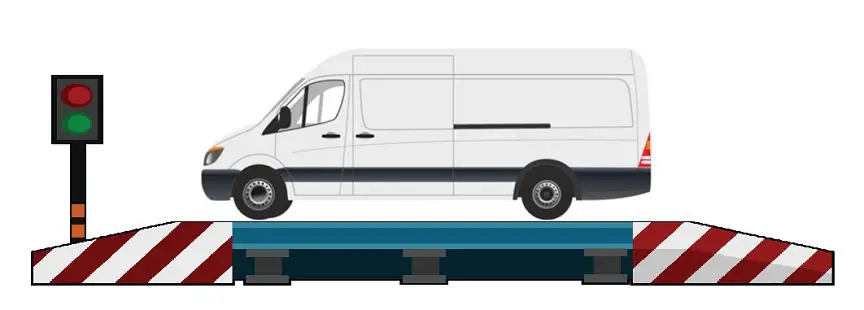There are no weigh stations specifically for cargo vans however, depending on the State you are in, you may have to stop at certain weigh stations.
Most States do not require cargo vans to stop at weigh stations however some States do if:
- They are registered as a commercial vehicle
- If their GVWR is over a certain amount, usually 10,000lbs or more, although in some States it is as low as 7,500lbs
- If the cargo van is rented for moving purposes
Weigh Stations
There are many weigh stations located in all States across the United States. The purpose of these weigh stations is to ensure that freight vehicles comply with the different weight restrictions relevant to each State.
These weigh stations may not always be open, but if they are, certain vehicles are required to stop and have their weight checked. Which vehicles have to stop to be checked will depend on each individual State’s laws.
Although most weigh stations require a vehicle to stop on the station in order to have its weight checked, some more modern stations only need for a vehicle to drive over it. The results are the same though, and any vehicle found to be exceeding its recommended weight or over State limitations will be penalized.
Gross Vehicle Weight Rating (GVWR)
The GVWR is the Gross Vehicle Weight Rating which includes the vehicle’ weight plus the weight of any freight it is carrying. This is the weight that weigh stations are interested in and so removing the freight to weigh the payload or the vehicle separately is not necessary.
DOT Number
The purpose of weigh stations is for the DOT (Department of Transport) to ensure commercial vehicles are complying with both Federal and State laws.
As well as checking the weight of a commercial vehicle, weigh stations may also check the DOT number and carry out inspections on a vehicle. A DOT number is allotted to any business which intends to move freight or passengers for commercial purposes in vehicles over a certain weight or capacity.
A DOT number is not automatically allotted, and so the owner of relevant vehicles must apply for it. For instance, if you own a cargo van with a GVWR of over 10,000lbs you may have to apply for a DOT number.
In most States any vehicle over a certain weight is considered a commercial vehicle regardless of its actual use. This means that if your cargo van has a GVWR above that weight, you may have to apply for a DOT number depending on which State you are in. If however, you are planning to drive in multiple States, you will have to check all of those States’ regulations.
Inspections at Weigh Stations
As well as checking the weight of the vehicle and any relevant DOT number, the DOT may also want to check a vehicle’s inspection records.
The driver or owner of any commercial vehicle is required to maintain appropriate and accurate inspection records for that vehicle. The DOT inspectors are also permitted to do their own check of a vehicle if they deem it necessary.
Inspection of Cargo Van
The inspections carried out by DOT staff are to ensure the commercial vehicle is not only within its legal weight limits, but also to ensure that the vehicle is transporting its freight in a safe manner.
If your cargo van is required to stop at weigh stations in any State, it too can be subject to an inspection.
The important factor in these instances is that not only has the GVWR not been exceeded, but the freight is also secure and safe. This will mean that whilst loading your freight, you did not exceed either of the two axle weights.
To ensure safe and secure loading of your cargo van, you should not only notice the axle weights but also disperse the load evenly and then secure it.
The best way of securing your freight in a cargo van is to load the larger items first and then place smaller items between them and the side walls. You should also try not to place any freight too close to the doors in case they inadvertently open.
One of the popular features of a cargo van is that it allows access to the cargo section directly from the driving position. Although this is a distinct advantage when making multiple drops, it may not be so advantageous when making long trips across multiple States.
If you are carrying freight in your cargo van and especially for long journeys, you should place a barrier between the freight and the driver. This barrier can be an easily removable net. The barrier will stop any freight that may break loose from distracting or even colliding with the driver and thereby cause an accident.
State Rules for Cargo Vans and Weigh Stations

The following States do not usually require cargo vans to stop at weigh stations, but it is still best to check prior to visiting the State:
Alabama, Connecticut, Delaware, Idaho, Illinois, Kentucky, Louisiana, Maine, Maryland, Massachusetts, Michigan, Mississippi, Missouri, Nevada, New Hampshire, New York, North Carolina, Oklahoma, Rhode Island, Tennessee, Texas, Utah, Vermont, and West Virginia.
In the following States you will have to stop at weigh stations if your cargo van meets the following criteria but check as sometimes laws may change:
- Alaska – Any vehicle with a GVWR over 10,000lbs
- Arizona – All vehicles with 10,000lbs or more GVWR
- Arkansas – Any vehicle or combination of vehicle and trailer with a GVWR above 10,000lbs
- California – All rental trucks such as U-Haul must stop
- Colorado – Only if your cargo van has a GVWR that exceeds 26,000lbs
- Florida – If the GVWR exceeds 10,000lbs or if it is carrying agricultural products
- Georgia – Any vehicle or combination of vehicle and trailer with a GVWR more than 10,000lbs
- Hawaii – Vehicles with GVWR over 10,000lbs must stop
- Indiana – Vehicle must stop if GVWR is above 10,000LBS
- Iowa – Must stop if GVWR is over 10,000lbs
- Kansas – A cargo van must stop if registered as a commercial vehicle
- Minnesota – Must stop if GVWR exceeds 10,000lbs
- Montana – Vehicle must stop if its GVWR is over 8,000lbs or it is carrying agricultural products
- Nebraska – Unless it is a pick-up pulling a recreational trailer, all vehicles over 1 ton must stop
- New Jersey – All vehicles exceeding 10,000lbs must stop to be weighed
- New Mexico – Only if your vehicle has a GVWR over 26,000lbs
- North Dakota – Usually vehicles over 10,000lbs must stop, but if your cargo van is being used for recreational purposes only, it does not have to
- Ohio – Commercial vehicles weighing more than 10,000lbs must stop if a weigh station is open
- Oregon – Only if the combined weight of your cargo van and trailer exceed 26,000lbs
- Pennsylvania – You must stop if you are carrying agricultural products or are towing a large trailer
- South Carolina – You may be directed to a weigh station if law enforcement officers suspect your load is unlawful or unsafe
- South Dakota – If your cargo van exceeds 8,000lbs
- Virginia – If the GVWR exceeds 7,500lbs
- Washington – If GVWR is over 10,000lbs
- Wisconsin – Vehicles over 10,000lbs must stop
- Wyoming – Police direct vehicles to stop on a random basis
Conclusion
Differing State regulations concerning cargo vans are not only limited to weigh station procedures, as other regulations may also differ.
Most States will only consider a cargo van to be a commercial vehicle if it has been customized to be so or has advertising placards on its sides.
Other States will however consider it to be a commercial vehicle if its GVWR exceeds a certain weight. Some States though automatically consider a cargo van to be a commercial vehicle.
If a State does consider your cargo van to be a commercial vehicle, then you will have to maintain inspection records and comply with all other rules for commercial vehicles. This will of course include it only being allowed to be driven by someone who holds a Commercial Driver’s License (CDL).
You are probably aware of all the rules and regulations concerning a cargo van in your home state, but if you are considering an interstate journey, those rules may not always apply.
If you are going to drive across the country, or even interstate, you must therefore check on the regulations that apply to the other states you intend to drive through.
All States will expect you not to overload your cargo van or load it in an unsafe manner. It is therefore recommended that you make a note of your cargo van’s GVWR and its individual axle weights. Also consider getting a net to separate the driver from the freight.


